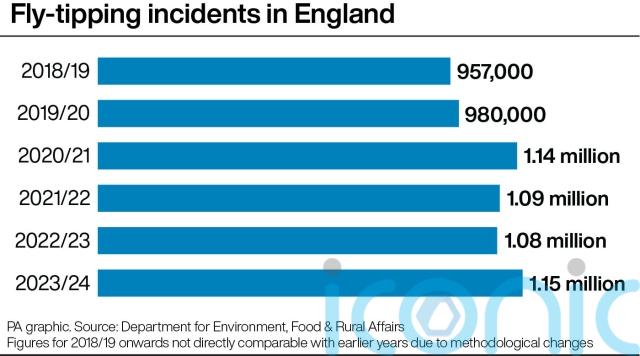
Local councils dealt with a record 1.15 million incidents of fly-tipping last year, a 6% increase on the previous year, figures show.
Countryside leaders warned the problem was even greater than the figures suggest as they only include rubbish dumped on public land, while farmers and rural businesses face stress, disruption and “staggering” costs to clear up waste illegally left on private land.
The data from the Environment Department (Defra) shows local authorities in England dealt with 1.15 million fly-tipping incidents in 2023/24.

That is an increase of 6% from the 1.08 million the previous year and the highest level in the six years since the current method for reporting was brought in.
Last year, some 60% of cases involved household waste, with 688,000 incidents of illegally dumped rubbish from homes, ranging from black bags of waste to the contents of shed clearances, furniture, carpets and DIY.
The most common place for fly-tipping to occur was on pavements and roads, accounting for 37% of incidents.
Nearly a third (31%) of incidents were the size of a small van load, while 28% were the equivalent of a car boot or less of rubbish.
But 4% were the size of a tipper lorry load or larger, with large fly-tipping incidents costing £13.1 million for councils to clean up, the figures show.
The figures also reveal a slight drop in the number of enforcement actions, with fixed-penalty notices and court fines both down on the previous year.
Responding to the figures, Environment Secretary Steve Reed said: “Fly-tipping is a disgraceful act which trashes communities and its increase is unacceptable. Communities and businesses shouldn’t have to put up with these crimes.”
He pledged the Government will crack down on fly-tipping and “punish rubbish dumpers, forcing them to clean up their mess”.

He also said the new Crime and Policing Bill gives ministers the power to issue statutory guidance to councils to drive up fly-tipping enforcement.
But Adam Hug, environment spokesman for the Local Government Association, said: “Councils are working tirelessly to counter the thousands of incidents every year and are determined to crack down on the problem.”
He warned the penalties from prosecution fail to match the severity of the offences committed.
“We continue to urge the Government to review sentencing guidelines for fly-tipping so that offenders are given bigger fines for more serious offences to act as a deterrent,” he said.
“Manufacturers should also contribute to the costs to councils of clear-up, by providing more take-back services so people can hand in sofas, old furniture and mattresses when they buy new ones.”

While the figures only cover incidents dealt with by councils on public land such as streets and alleyways, housing estates, parks and car parks, Country Land and Business Association (CLA) president Victoria Vyvyan said rural communities are also being targeted for fly-tipping on private land.
“Farmers and the countryside are increasingly being targeted by organised crime gangs – often violent – who know that rural areas are under-policed and so they target them,” she warned, calling for Labour’s promised rural crime strategy to be published as soon as possible.
“It’s not just litter blotting the landscape, but tonnes of household and commercial waste which can often be hazardous – even including asbestos and chemicals – endangering farmers, wildlife, livestock, crops and the environment.”
George Williams, a rural business owner in the West Midlands, said he deals with fly-tipping on his land almost every week, with waste ranging from animal carcasses to cannabis waste and 60 tonnes of plastic dumped by a criminal gang.
“Beyond the stress and disruption, the financial cost is staggering,” he said.
“We’ve spent thousands removing waste, installing cameras, and putting up barricades, but it hasn’t stopped the problem.”
He called for tougher fines and a more proactive approach from councils to stop the criminals.
Subscribe or register today to discover more from DonegalLive.ie
Buy the e-paper of the Donegal Democrat, Donegal People's Press, Donegal Post and Inish Times here for instant access to Donegal's premier news titles.
Keep up with the latest news from Donegal with our daily newsletter featuring the most important stories of the day delivered to your inbox every evening at 5pm.